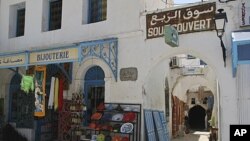What's next for Tunisia? After a revolution and its first democratic elections, the North African country must now craft a new political system. The next government faces formidable economic problems. And while Tunisia's popular uprising inspired revolts across the Arab world this year, can it serve as a model for future Arab democracies?
After the celebrations, many Tunisians are back at work - or at coffee houses, a favorite hangout for the many unemployed men.
Ennahdha victory
The moderate Islamist Ennahdha party won the most seats in Sunday's vote for a Constituent Assembly. But it is already in talks with its rivals.
Ennahdha spokeswoman Yusra Ghannouchi says the party's message is inclusive. "We believe these ethical values that inspire us are universal values, and we believe there is much in common between us and other Tunisian secular parties," she said.
The assembly must write a new constitution and appoint an interim government to run daily affairs. That's only part of the challenge.
Unemployment - which helped drive Tunisia's January revolution - remains high. Investment is down. So is the country's key tourism industry.
Looking forward
But political blogger Kerim Bouzouita is optimistic that will change. He claims the revolution also eradicated widespread corruption that existed under ousted dictator Zine el Abidine Ben Ali.
"With Ben Ali's regime, we got a mafia. In Tunisia, it wasn't really a free market. If you wanted to make business, you had to deal with the Ben Alis," said Bouzouita.
Tunisia expert Steven Ekovich, of the American University of Paris, predicts a tough road ahead for this small country.
"The problems are long-term, they're deep. It's going to take a long time for Tunisia to pull out of it. But if any country can do it, I think Tunisia can."
Role model?
But can Tunisia, which inspired other Arab Spring uprisings, be a model for democratic change? Two other Arab countries - Egypt and Morocco - hold elections next month.
Tunisia is small, modern, relatively homogeneous and Western-oriented. Its population is highly educated. Unlike protests elsewhere in the Arab world, its revolution was relatively peaceful.
"Tunisia will be an experience. But I don't know if it will be a model. It won't depend on Tunisians, but on Syrians, on Yemenis, on Egyptians," said Kerim Bouzouita.
But the Arab world will be watching Tunisia's democratic experience. If it works, it may become the first of others to come.




